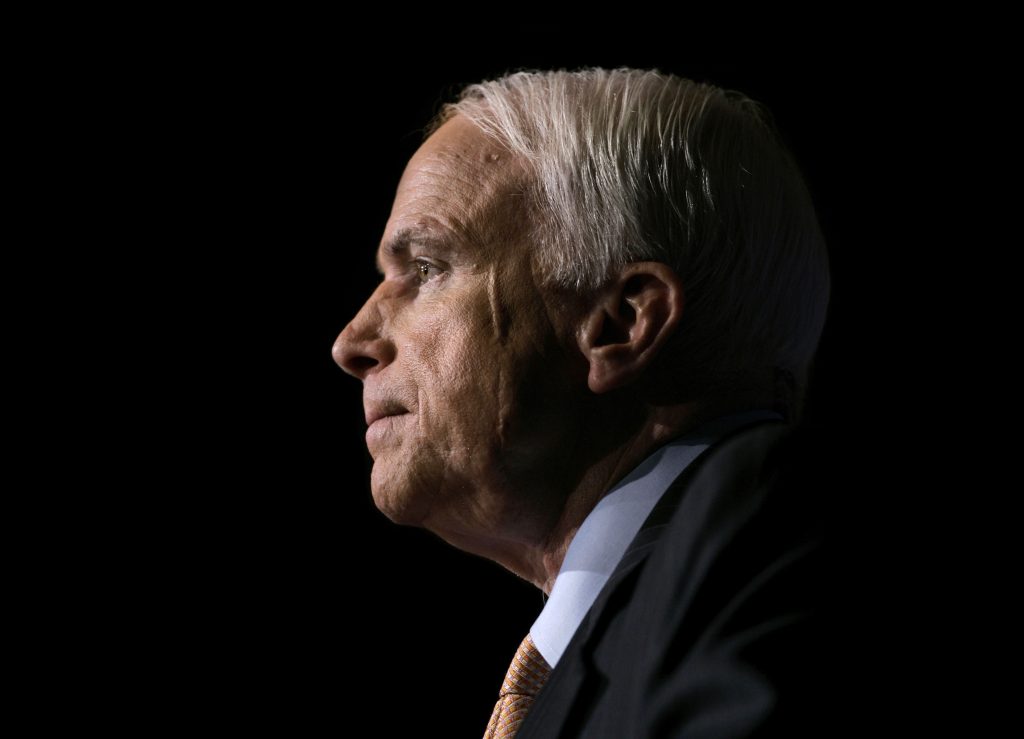Sen. John McCain died on Saturday after a year-long battle with brain cancer. In his final hours, he was surrounded by those he loved most on his family ranch in Cornville, Arizona.

Sen. John McCain, R-Ariz., pauses while speaking to the GOPAC Fall Charter Meeting in Washington, D.C., in 2006. McCain died Saturday, Aug. 25 after a fight with brain cancer. (AP Photo/J. Scott Applewhite, file)
His passing has put most of the country in a state of mourning. Despite growing polarization and enmity between the two parties, Democrats and Republicans alike can agree that McCain was the definition of an American patriot.
But that’s the dichotomy about death: It brings pain, loss, tears — a permanent separation — and yet, it can bring family, friends and even competitors together to celebrate and remember a life that intertwines them all.
McCain requested that his past presidential rivals, former Presidents Obama and George W. Bush, as well as former Vice President Joe Biden speak at his funeral.
McCain’s legacy is a complex one, considering the various paths he has taken: prisoner of war, U.S. Senator, victim of Trump’s unabashed mockery and bullying. He leaves behind a widow, children, grandchildren and a country that will greatly miss his grit, ambition and undying loyalty.
As a young man, McCain — like his father and grandfather before him — served in the U.S. military. During his volunteer combat duty in Vietnam, he was captured, tortured and subjugated to almost two years in solitary confinement. After his release, he was awarded the Silver Star, Bronze Star, Purple Heart and Distinguished Flying Cross.
I understand there are those who may not agree with certain policies McCain advocated for, myself included. As someone whose family has voted Democrat since the New Deal, there were many things I didn’t agree with the late Senator on, from abortion to foreign policy.
But, I still believe that he loved his country and our values of liberty, freedom and courage.
When a voter at his rally insisted Obama was “an Arab,” McCain not only corrected her but also urged his own supporters to stop hurling insults and slurs at his Democratic opponent. In that moment, McCain had a choice. He could have taken advantage of the woman’s ignorance and used it to manipulate others, but instead, he decided to stand with the truth. He practiced a respectable policy — that we shouldn’t spread blatant lies about our adversaries simply because we dislike their perspectives.
This all happened a decade ago, yet it seems so far away, considering the dark discourse the country has taken in regards to not only the truth but the way we deal with our competitors, especially in the political arena.
Even as a Democrat, I was quite taken aback by Trump’s belittlement of McCain’s war experiences and berating of his dramatic vote to uphold the Affordable Care Act. What was as particularly interesting as it was disturbing was the lack of outcry from Republican politicians and lawmakers to defend their fellow countryman against the onslaught of a man who has made an entire mockery of their values.
As the Rev. Martin Luther King Jr. said, “In the end, we will remember not the words of our enemies but the silence of our friends.”
Over the past year, it has became apparently clear that a man like McCain, a true conservative, would no longer be welcome in the Republican Party that exists today.
Personally, I think McCain’s passing marks the end of an era — when political opponents could still defend each other against slander and politicians didn’t have to rely on the darkest fringes and unhealed wounds of our nation’s history to get elected.
But that time is done and gone, and sadly, so is Sen. McCain.
Sue Patton-Bey is a senior journalism and Arabic major from Oxford.






